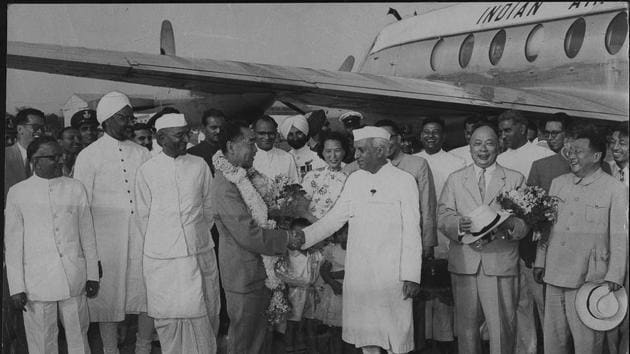When China wanted to make peace with India
India spurned overtures from China between 1959 and 1960 to reach an amicable settlement. More importantly, policymakers misread India’s relative position in the changing international environment. This proved costly with India sleepwalking into conflict with a radicalised Mao in 1962.
In April 1960, Zhou Enlai embarked on an ambitious diplomatic mission to India to attempt a resolution. Let us recall the context. The previous year, Sino-Soviet differences had come to the fore, ironically because Moscow publicly broke ranks with Beijing by taking a neutral position on the India-China dispute, and by the first half of 1960, Moscow had withdrawn its experts from China and suspended all economic contracts. The year 1959 had also witnessed two border skirmishes between India and China, including an especially nasty one in the western sector in Ladakh where nearly a dozen Indian security personnel were killed during a patrol in October.

As a consequence, the Chinese had come under pressure, particularly from the Soviets. In a rather heated conversation between Nikita Khrushchev and Mao Zedong shortly after that skirmish, the Soviets came down hard on the Chinese for escalating the dispute:
Mao Zedong: “Nehru also says that the events in Tibet occurred on our fault. Besides, in the Soviet Union they published a TASS declaration on the issue of conflict with India.”
NS Khrushchev: “Do you really want us to approve of your conflict with India? It would be stupid on our part.”
NS Khrushchev: “...If you allow him (Dalai Lama) an opportunity to flee to India, then what has Nehru to do with it? We believe that the events in Tibet are the fault of the Communist Party of China, not Nehru’s fault.”
(After an intense exchange, Mao placates the Soviets and promises a peaceful settlement.)
Mao Zedong: “You will see for yourselves later that the McMahon line with India will be maintained, and the border conflict with India will end...The border issue with India will be decided through negotiations.”
It was in such a backdrop that Beijing made a decision in January 1960 to take a more pragmatic line on the dispute with India as well as other unresolved frontier disputes with neighbouring countries. The People’s Liberation Army (PLA) was also ordered to adopt a policy of restraint and avoid armed clashes. Mao sensed that China was facing a difficult international environment and, therefore, decided to seek a negotiated settlement.
This basic sense of insecurity is reflected in a May 1959 Chinese note to India, which might have been personally drafted by Mao.
“The enemy of the Chinese people lies in the east — the US imperialists have many military based in Taiwan, in South Korea, Japan and in the Philippines which are all directed against China. China’s main attention and policy to struggle are directed to the east, to the west Pacific region, to the vicious and aggressive US imperialism, and not to India or any other country in the southeast Asia and South Asia....our principal enemy is US imperialism...China will not be so foolish as to antagonize India in the west. Our Indian friends! What is [on] your mind? Will you be agreeing to our thinking regarding the view that China can only concentrate its main attention eastward of China, but not south-westwards of China, nor is it necessary for it to do so. Friends! It seems to us that you too cannot have two fronts. Is it not so? If it is, here then lies the meeting point of our two sides. Will you please think it over?”
But Jawaharlal Nehru felt this Chinese telegram had been “discourteous” and he rebuffed the implied suggestion to stabilise the crisis with China. Foreign minister Chen Yi was equally candid when he shared Chinese threat perceptions to Swaran Singh in April 1960. Chen candidly admitted, “Our relations with the US and Japan in the east are tense. It would be stupid if we created a tense situation with India in the west also. The USA has its bases around us, atomic missiles and atomic weapons around us. Our dispute with India is very small...We are in a serious situation and need your friendship...The situation in the east being so tense we cannot afford to have trouble in the west also...If two ordinary countries are negotiating, they do not expose their difficulties to each other. (But) I am telling you about our difficulties... It would be best if we could reach some overall settlement, but if that is not possible some interim arrangement could be made.”
Zhou’s Delhi visit was an outcome of Beijing’s policy to defuse tensions and arrest a worsening of its geopolitical environment. In his meeting with Nehru, Zhou explicitly offered that the Line of Actual Control could form the basis of a settlement. But, for India, how could there be any swapping of claims or “horse trading”, as Nehru put it, if all the territory, whether Arunachal Pradesh in the east or Aksai Chin in the west, were Indian?
India spurned overtures from China between 1959 and 1960 to reach an amicable settlement. More importantly, policymakers misread India’s relative position in the changing international environment. This proved costly with India sleepwalking into conflict with a radicalised Mao in 1962.



